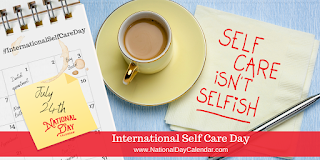Self-Care Is Self-Preservation
“Self-care is not self-indulgence, it is self preservation.”- Audre Lorde.
Those of us who are caregivers know how challenging it is to make time for self-care. As a caregiver you do not have any down time or time off. The primary focus of the caregiver is always on the individual/s being cared for. It is not uncommon for caregivers to encounter those insensitive folks who render thoughtless comments regarding the worth of those who care for others. Whether you provide caregiving duties in an institution or a home the task can be quite daunting. The fact is we live in a society where the value of caregivers is discounted. As a result those who are in this noble task find it difficult to put aside time to cater to their own needs. Attending to one’s needs is not selfish, not by the stretch of one’s imagination, in fact it is a matter of preservation and survival. However, despite this sad reality self-care is critical in replenishing one’s self in order to continue the journey of caring for others.
The Global Self-Care Federation (GSCF) describes self-care as any action that an individual takes to look after their own health, based on the knowledge and information available to them. This practice can also occur in collaboration with healthcare professionals when needed. Actively managing your own health and well-being through self-care has numerous benefits, including better choice between healthcare options, better care for individual well-being and better value for governments and health systems worldwide.
In 2011, the International Self-Care Foundation started international self-care day to raise awareness about the importance of self-care to overall wellbeing. This day is recognized each year on July 24th. Self-care is the practice of looking after your health based on the knowledge and information you have. It is a decision-making process that empowers individuals to look after their health efficiently and conveniently, together with health and social care professionals as needed. Self-care is a holistic approach to wellness. This approach includes the physical, mental, and emotional well-being. For some, self-care also includes taking care of themselves spiritually, or else it could be as simple as having some quiet time each day. For some self-care might mean enjoying themselves with their friends, maintaining a regular sleep pattern, having a spa day, going to the movie, eating a balanced and healthy diet and engaging in physical activities. However, oftentimes we tend to forget that those who self-care for others are loners and might not have that network of friends and or support. Sadly, the voices of those are often muted in the discourse regarding self-care. The church community can be and should be a source of support. The truth is we do not place much value on the elderly and regrettably even the church has been found wanting in this regard.
GSCF’s 2022 International Self-Care Day campaign builds on the #SelfCarePromise theme, which encourages everyone to make and share their personal commitment to embrace a specific self-care action. This year, we are specifically focusing on the topic of resilience.
The World Health Organization (WHO) defines self-care as individuals, families and communities’ promoting and maintaining their own health, preventing disease, and coping with illness and disability, with or without the support of a health worker.
Why is self-care so important?
Self-care is about empowering people to be active agents in their own healthcare. As well as being the right thing to do, with more and more pressure on health systems there is a great need. According to the WHO 4.3 billion people have inadequate access to essential facility-based health services, 1 in 5 of the world’s population now living in humanitarian crisis, in which health systems are challenged to deliver essential services and pandemics, such as the COVID-19,armed conflicts and climate change have disrupted health services globally. Self-care is not gender specific. The reality is most men still are a bit uncomfortable in spending time to care for themselves. This gendered mindset needs to be interrogated in order that both sexes are comfortable regarding self-care.
No matter what kind of self-care you practice, you are bound to reap benefits. Having a healthier mind and body are the two main benefits. Other benefits include feeling less stressed and being less overwhelmed. Self-care is very important for caregivers. It is easy for caregivers to give all of their time and energy to another person, and in doing so; it will take a toll on their health, both physical and or mental. It is useful to check in on the caregiver occasionally just to find out what is happening. Perhaps you can assist by sponsoring the caregiver to a movie or a massage. It is not an act of selfishness to take care of yourself first; it is an act of love and necessity. Make time for yourself. Happy International Self-Care Day.
In the words of Eleanor Brownn, rest and self-care are so important. When you take time to replenish your spirit, it allows you to serve others from the overflow. You cannot serve from an empty vessel.
Wayne Campbell is an educator and social commentator with an interest in development policies as they affect culture and or gender issues.
waykam@yahoo.com
@WayneCamo
©
#InternationalSelfCareDay





Comments
Post a Comment